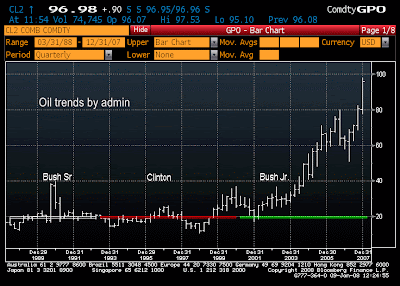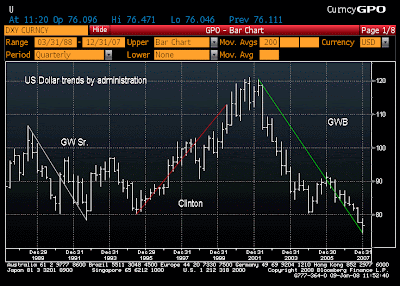The Laurel Comment
“China, for 18 of the past 20 centuries, has been the largest economy in the world and will be again this century”.
-Chris Patten (former Governor of Hong Kong)
Markets
January did not treat the world’s bourses very kindly and despite the continuous economic warnings of the last year, the downside momentum still came as quite a surprise to the unprepared and the “none so blind…”
Among the first 2007 warning shots was the February shakeout in China which transcended European and North American markets in quick succession. This potential for debacle however ended in an Asian minute as markets reversed course and soared to new highs, at least on the surface of things, for underneath the indexes the real story of what was to come had just begun to unfold.
The sub prime mess and the housing decline in the U.S. did not appear overnight, last Christmas or even last summer. They were both well known and well documented prior to both the August and November meltdowns, and were amply illustrated by the “financial” indexes which had peaked in the spring of 2007 dropping major bank stocks anywhere from 20 to 60 percent with Citigroup having led the way.
The Federal Reserve strongly intervened during the August crash awarding markets a three month respite, by January the Fed had exercised outright panic proving that their ability to follow far exceeded their talent for leadership.
So now it is February and many investors are wondering what is in store for 2008 and beyond. Will there be more panic, a deep recession, a global meltdown or will the world slog through its present difficulties and emerge solvent but chastened?
The answer to part one will be positive in this writer’s view as the actions of the Federal Reserve to liquefy the system in order to save it is always a short to medium term winning strategy. The answer to part two is even clearer, chastened capitalism is an oxymoron. There will always be excesses that lead to bubbles that end in troughs. This is a product of both a successful system and human nature.
As many readers are aware “The Comment” has been bearish on markets for many months now while it has remained bullish on gold and special energy situations for a somewhat longer period. This former position on markets has now changed. It is our belief that the financials lead markets both up and down and we now suggest that the bottom in this group was achieved in mid-January. In short the new market leadership will come from this sector, one best accessed through the purchase of specific exchange traded funds. The XLF in New York and either the HFU or XFN in Toronto will allow investors to buy the group rather than trying to choose a particular winner. Our position on gold remains not only unchanged but reinforced as our 1000 short term target fast approaches. We believe that $1500 in 2008 remains a distinct possibility as the massive financial infusions of the world’s central banks have further devalued most currencies. Buy precious metals, Japanese Yen and do the former through the aforementioned ETFs.
There will continue to be a great deal of talk during the coming year about the outcome a Democratic victory would have on stock markets. Don’t believe the talking heads on the business channels as they are, with few exceptions, reactionary Republicans whose idea of the common good rests with their own pay cheques. Markets have historically outperformed under Democratic administrations. The accompanying charts prove the point.
“China, for 18 of the past 20 centuries, has been the largest economy in the world and will be again this century”.
-Chris Patten (former Governor of Hong Kong)
Markets
January did not treat the world’s bourses very kindly and despite the continuous economic warnings of the last year, the downside momentum still came as quite a surprise to the unprepared and the “none so blind…”
Among the first 2007 warning shots was the February shakeout in China which transcended European and North American markets in quick succession. This potential for debacle however ended in an Asian minute as markets reversed course and soared to new highs, at least on the surface of things, for underneath the indexes the real story of what was to come had just begun to unfold.
The sub prime mess and the housing decline in the U.S. did not appear overnight, last Christmas or even last summer. They were both well known and well documented prior to both the August and November meltdowns, and were amply illustrated by the “financial” indexes which had peaked in the spring of 2007 dropping major bank stocks anywhere from 20 to 60 percent with Citigroup having led the way.
The Federal Reserve strongly intervened during the August crash awarding markets a three month respite, by January the Fed had exercised outright panic proving that their ability to follow far exceeded their talent for leadership.
So now it is February and many investors are wondering what is in store for 2008 and beyond. Will there be more panic, a deep recession, a global meltdown or will the world slog through its present difficulties and emerge solvent but chastened?
The answer to part one will be positive in this writer’s view as the actions of the Federal Reserve to liquefy the system in order to save it is always a short to medium term winning strategy. The answer to part two is even clearer, chastened capitalism is an oxymoron. There will always be excesses that lead to bubbles that end in troughs. This is a product of both a successful system and human nature.
As many readers are aware “The Comment” has been bearish on markets for many months now while it has remained bullish on gold and special energy situations for a somewhat longer period. This former position on markets has now changed. It is our belief that the financials lead markets both up and down and we now suggest that the bottom in this group was achieved in mid-January. In short the new market leadership will come from this sector, one best accessed through the purchase of specific exchange traded funds. The XLF in New York and either the HFU or XFN in Toronto will allow investors to buy the group rather than trying to choose a particular winner. Our position on gold remains not only unchanged but reinforced as our 1000 short term target fast approaches. We believe that $1500 in 2008 remains a distinct possibility as the massive financial infusions of the world’s central banks have further devalued most currencies. Buy precious metals, Japanese Yen and do the former through the aforementioned ETFs.
There will continue to be a great deal of talk during the coming year about the outcome a Democratic victory would have on stock markets. Don’t believe the talking heads on the business channels as they are, with few exceptions, reactionary Republicans whose idea of the common good rests with their own pay cheques. Markets have historically outperformed under Democratic administrations. The accompanying charts prove the point.


 The most compelling argument in Democratic times is the one that small caps and tech stocks in general fare better than large caps and defence related companies. We wonder why.
The most compelling argument in Democratic times is the one that small caps and tech stocks in general fare better than large caps and defence related companies. We wonder why.Think too of the regulatory bodies which were put to sleep during the Bush and Reagan years enjoying a revival, a time to come when we hope that white collar crime has the same stigma as armed robbery. Try this metaphor on; think what would have happened on the streets of New York if all the policemen had been sent home for the past eight years.
Be bold in bad times and careful during the fourth, fifth and sixth boom years and you will likely do well.
Commentary
George Bush recently presented his government’s 2009 budget. The main points propose cuts for Medicaid, medicare and education while increasing the defense portion to its largest figure (adjusted for inflation) since World War II, a number that does not include the off budget spending on the Iraq/Afghanistan mess, another 200 billion.
The good news resides in the fact that this is the last Bush Budget, the bad news may be the continuation of his disastrous Middle East policy should Senator McCain win the Presidency now that the Super Tuesday primaries appear to have assured his nomination. This is not to say that any of the other Republican choices were or are better than McCain but more of the same is not what either America or the World needs at this juncture.
The momentum story of these 2008 primaries has obviously been that of Barrack Obama who despite his rather thin resumé is proving to be an inspirational public figure. This campaign has resonance for those of us who remember 1968 when an assassin stole the spirit of America and gave the world Richard Nixon in its place.
The Democrats in power are not like the Republicans because the people that surround and advise Democratic administrations are demonstrably more pragmatic and far less agendized. In short President Obama will not have a Vice president Cheney, he may instead have a team made up of the “best and the brightest”.
Remarkably
Writing a bullish market letter in the midst of a crash is not an easy task, particularly when one is aware of some very severe pitfalls in the underlying fiscal and monetary structure of the world’s largest economy. It is a time when faith, not in religion, but in history helps to restore the balance between what is and what is likely to be.
The banking systems of the world have been refinanced. The securitization of bank assets (conversion of existing assets into marketable securities) does not however necessarily solve the economic crisis that the bursting of the housing bubble has effected. The problem, as some more learned than I have begun to emphasize, is the slowing in the velocity of money from bullish multiples to deflationary negatives. This slowing of the economy may be attributable to a number of things many of which have ominous similarities to the mid to late 70s when money last moved en masse from consumers to the sovereign funds.
The OPEC led oil price rise at that time effectively moved circulating dollars that were better utilized buying fridges, stoves, cars and life’s necessities into the bank accounts of Arab Sheiks who bought planes, gold and collectibles in countries where trickle down economics was a literal experience.
This time around, the supply crisis for oil along with the political risk price due to Bush policies has added to the commodity price boom, thereby enriching the sovereign wealth funds who now seem to be more intent on buying existing assets than creating new ones. This and the Bush tax breaks to the already wealthy have combined to place money in the hands of those who don’t spend it, a phenomena that may also explain why the world market indexes stayed up over the last year while the underpinnings were crumbling.
In essence, it is possible to create enormous liquidity but if the banks don’t lend it and the people don’t spend it, the economy comes to a halt. To be crude, it is somewhat similar to someone with lots of Viagra but no partner.
Finally it is good to remember two things; the opening quote and the proven market adage “don’t fight the Federal Reserve”. After all during the 1920’s Germany under the Weimar Republic saw its stock market rise from 600 to 29,000; grant it they did print so much money that the entire Daimler Company was worth only 342 of its cars in then current US dollars. Daimler did survive.
Geoff Ryan
February 6, 2008
GeoffreyRyan@hotmail.com
514-795-8450
http://thelaurelcomment.blogspot.com/